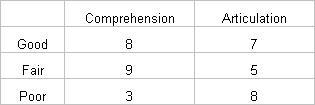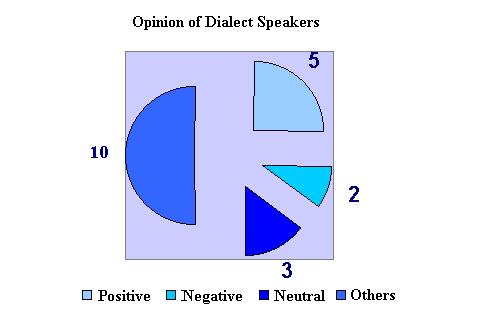|
Our group conducted a survey
with people around our age group (age 20-25) to ascertain if the aggressive nature of the SMC had a disproportionate
effect on the dialects in Singapore. We also wanted to see if our personal views and experiences with dialects were
representative of the members in our demographic. The results were based on a sample size of 20.
1)
Do you speak* (*by speak, we mean ability to comprehend and
articulate) any dialect? If no, what language
do you speak mainly and
SKIP QUESTION 2)
2) If yes, to whom? How do you rate your proficiency level?
(comprehension only, or plus articulation)
3) Do you find that Mandarin is replacing the role of dialects in places
eg. home/market/hawker centre?
If yes, has Mandarin "diluted" your
dialect? (eg. do you replace the words you can't say in dialect with
Mandarin instead?)
4) What is your opinion of people who speak dialects?
5) Given a chance, would you join classes provided
for the learning of
your dialect?
6) If you have children in the future, would you want them to learn your own (or any) dialect? Why and why
not?
The Results
Question 1 and 2
Out of the 20 informants,
19 of them speak a dialect with varying degrees of proficiency. Only 1 could not speak a dialect. We grouped the results according
to 3 levels of proficiency; good, fair and poor. This is illustrated in the table below:

Most of our informants have fair to good comprehension of a dialect, but
displayed the extremes of poor and good articulation. A point to note here is that there are more people who are poor in articulation
compared to comprehension. A reason for this could be that the infrequency of dialect usage has caused our informants to become
less proficient in speaking it.
Question 3
Of our 20 informants, 18 agreed that Mandarin has replaced dialects in most of its traditional domains. They also agreed
that Mandarin has exerted an influence on dialects, resulting in Mandarin borrowings peppering the dialect they speak.
A pertinent point raised by one of our informants is that this diluting effect is restricted to younger people; older
people usually continue to speak dialect in these domains.
Another point to note is that Mandarin is not the sole reason for this phenomenon; English plays a part too. However
since our focus is on Mandarin, this will not be dealt with.
Based on personal experience, we observed that hawkers and market stallholders usually speak to us in Mandarin. This
is not the case when they converse with their older customers. Here, there is an implicit belief on the part of the hawkers
that people of our age do not, or are uncomfortable with, speaking dialects.
Question
4
We grouped the results of this question according to 4 categories: Positive,
Negative, Neutral and Others. 5 of our informants felt positively towards dialect speakers and the overwhelming reason they
gave was that dialect speakers were "keeping in touch with their roots".

Only
2 of our informants had a negative view of dialect speakers; one felt that it was "crude and uneducated" while the other individual
viewed dialects as residing at the bottom of the linguistic hierarchy, whereby only people who were not proficient in other
languages spoke it.
Of the 10 who were grouped in the last category, 6 felt that the age of the speaker would affect the way in which they
were perceived. The consensus among the 6 is that younger speakers tended to sound "Ah Beng-ish", "uncouth" or just plain "weird".
An interesting point we noticed was that not all dialects are viewed the same way.
One of our informants stigmatized
Hokkien speakers as being "uncouth" while another felt that younger dialect speakers
tend to come across as being "rough" and "uncouth", with the exception
of Cantonese speakers.
Question
5
Of the 20 informants,
only 5 said that they would join classes to learn their own dialect. Of the 14 who would not join classes, 2 preferred to
learn dialect informally.
Question 6
Most (16) of our informants
would like their children to learn to speak a dialect. The most common reason given is that it will let them keep in touch
with their roots.
Of the 2 who did
not want their children to learn their own dialect, one saw no point in doing so and the other was afraid that learning a
dialect would affect his child's learning of English and Mandarin (which he viewed as being more important).
The remaining 2 said that they would leave it to their children to decide for themselves if they wanted to speak
dialects.
Although most of our informants would not want to join classes to learn dialects, it is heartening to note that 80%
of them want their children to learn their own dialect. This lays the foundation for a potential revitalization of dialects
in Singapore.
|

